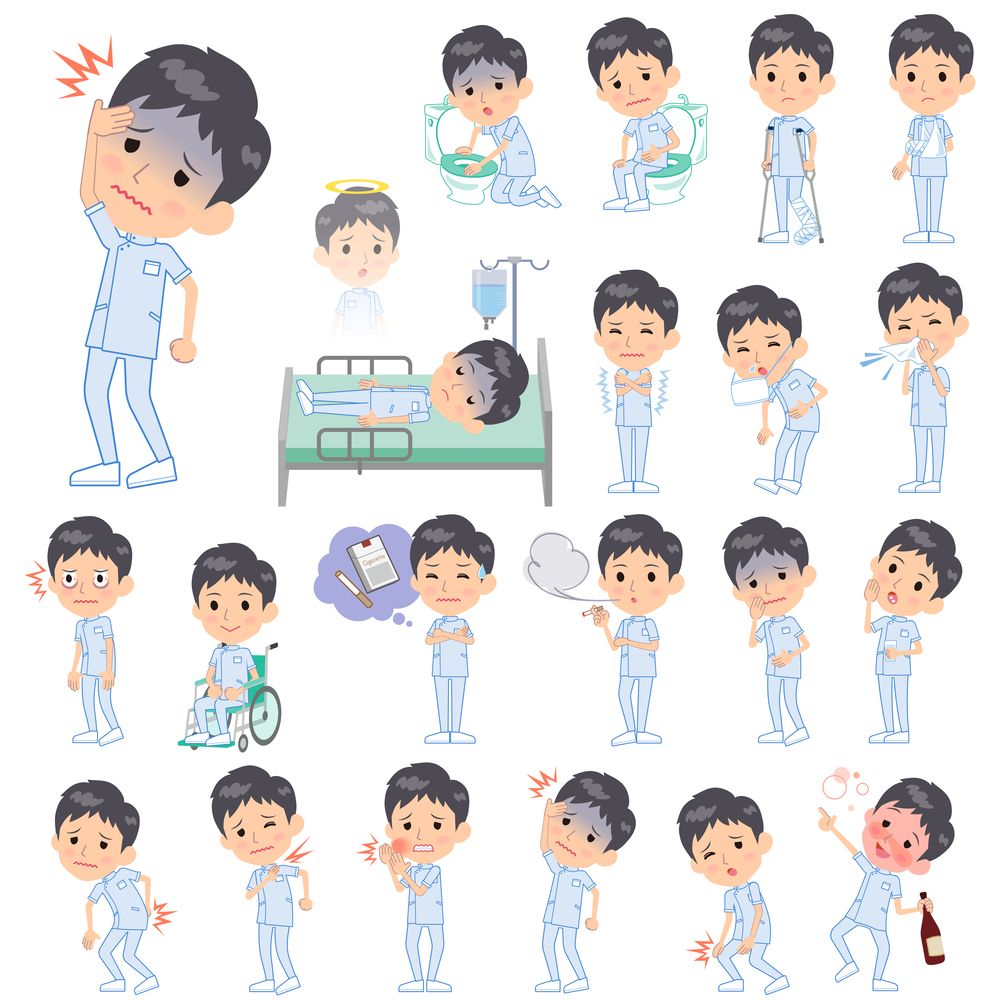Inside the Mind of a Factitious Disorder Patient: A Deep Dive
Lesson 17
This article will delve into Factitious Disorder, comprehensively exploring this condition. We aim to provide a clear understanding of what Factitious Disorder entails and its various manifestations. Additionally, we will discuss this disorder's causes, diagnosis, treatment, and management, providing readers with a complete understanding of this complex condition.
Factitious disorder, a perplexing condition where individuals deliberately fabricate or induce illness for psychological satisfaction, has confounded medical professionals for centuries. This puzzling disorder, first coined "Munchausen syndrome" after a Baron known for his exaggerated tales, encompasses odd patient demeanours that fascinate and frustrate clinicians.
Table of Contents
- Key Takeaways
- Introduction
- What is a Factitious Disorder
- Defining Factitious Disorder and Its Motivations
- The Distinction Between Factitious Disorder and Malingering
- Factitious Disorder by Proxy: When Caregivers are Involved
- The Historical Context of Factitious Disorder
- The Role of Karl Frederick Hieronymus in the Disorder's Nomenclature
- The Prevalence and Challenges of Diagnosing Factitious Disorder
- Estimated Impact on Inpatient Hospital Patients
- The Importance of Thorough Investigation Before Diagnosis
- Red flags for disorder
- Case Studies and Legal Implications
- A Notable Case of Factitious Disorder in Arizona
- The Legal Consequences and the Potential for Litigation
- Factitious Disorder in Comparison to Other Disorders
- Contrasting Factitious Disorder with Somatic Symptom Disorders
- Understanding the Psychological Satisfaction Sought by Patients
- Expert Insights and Scientific Perspectives
- Quotes from Medical Experts on Diagnosis and Management
- Exploring the Possible Link to Brain Development
- Contributions of the American Medical Association (AMA)
- Educational Resources from the Cleveland Clinic
- Transhausen by proxy
- Malignant Narcissism within Medical Child Abuse
- Munchausen by internet
- Munchausen by internet Case study
- Differentiate between malingering and hypochondria
- HBO's thriller series Sharp Objects included Munchausen in their plot
Key Takeaways
- Factitious disorder is a mental illness where individuals deliberately produce or exaggerate symptoms of disease to assume the "sick role."
- Factitious disorder is distinct from malingering, as the motivation is psychological satisfaction rather than material gain.
- Factitious disorder can be imposed on oneself or another (by proxy), involving caregivers.
- The prevalence of factitious disorder is estimated to be around 1% among inpatient hospital patients, but it is likely underdiagnosed.
- A thorough investigation is crucial before diagnosing factitious disorder, and symptoms should only be attributed to the illness with proper examination.
- While the condition is considered rare, with an estimated 600 to 1,200 new cases each year in the U.S.A., Dr Feldman believes it is more common but often goes undetected, let alone prosecuted.
- Most perpetrators of Munchausen syndrome by proxy MSBP abuse are women at an estimated 90% to 98%.
This article will delve into Factitious Disorder, comprehensively exploring this condition. We aim to provide a clear understanding of what Factitious Disorder entails and its various manifestations. Additionally, we will discuss this disorder's causes, diagnosis, treatment, and management, providing readers with a complete understanding of this complex condition.
Medical child abuse, AKA, Munchausen syndrome by proxy or factitious illness imposed on another was first described in 1977 by the English paediatrician Meadow also named the syndrome the “hinterland of child abuse.”
Factitious disorder, a perplexing condition where individuals deliberately fabricate or induce illness for psychological satisfaction, has confounded medical professionals for centuries. This puzzling disorder, first coined "Munchausen syndrome" after a Baron known for his exaggerated tales, encompasses odd patient demeanours that fascinate and frustrate clinicians.
Though estimates vary, over 1% of hospital inpatients may meet the criteria for factitious disorder. Yet even seasoned physicians struggle to reconcile how patients find gratification in illness or discern factitious disorders from malingering. This ongoing mystery persists despite advances in medical technology and diagnostic criteria in the DSM-5. Instead, they genuinely believe they are ill and go to great lengths to maintain this belief.
The behaviours associated with Factitious Disorder can be perplexing and challenging to understand, as they often involve elaborate deceptions, such as self-inflicted injuries or falsifying medical records.
Furthermore, these individuals may even seek out unnecessary medical procedures or tests to perpetuate their illness narrative. As medical professionals strive to gain a better understanding of this disorder, it becomes evident that greater awareness and education are crucial in identifying and treating those affected by Factitious Disorder.
Factitious Disorder is a complex psychiatric condition that continues to baffle medical professionals and researchers alike. This disorder involves individuals purposely feigning or exaggerating a physical or psychological in order to assume the role of a patient.
The motivations behind this behaviour can vary, but it often stems from a deep-seated need for attention, sympathy, or gratification derived from assuming the sick role. It is important to note that individuals with Factitious Disorder are not simply "faking" their symptoms; psychological symptoms.

What is a Factitious Disorder
Factitious disorder refers to a false condition where individuals deliberately produce or exaggerate physical or psychological symptoms to assume the "sick role". This is done to attain psychological satisfaction, not material gains, and is different from malingering. The disorder can be imposed on the self or others (by proxy).
While the exact motivations behind factitious disorder are complex, some research suggests it may be linked to differences in brain development that affect emotion regulation. However, our understanding of this puzzling disorder remains limited. Reliable statistics on prevalence are unavailable, but estimates indicate over 1% of hospital inpatients meet this criterion for diagnosis.
Defining Factitious Disorder and Its Motivations
Factitious disorder refers to a condition where individuals deliberately produce or exaggerate physical or psychological symptoms to assume the "sick role" for psychological satisfaction, not material gains.
This differs from malingering, where the motivation is external incentives like money or legal leniency.
The DSM-5 defines two types of factitious disorders - imposed on self and imposed on another (by proxy). In both cases, the feigned or self-inflicted symptoms lead to repetitive hospitalisations or invasive procedures.
What drives this extreme behaviour? While the motivations are complex, some research suggests it may relate to differences in brain development affecting emotion regulation. Factitious disorder may fulfil an unconscious psychological need in these individuals by allowing them to assume the "sick role" and garner attention from medical providers. However, significant gaps still need to be in our understanding of this perplexing syndrome.
The Distinction Between Factitious Disorder and Malingering

An important distinction exists between factitious disorder and malingering. While both conditions involve feigning illness, the underlying motivations differ.
Individuals with factitious disorder fabricate symptoms to assume the "sick role" for internal psychological satisfaction. By contrast, those who suffer feign illness for external incentives like financial gain, time off work, drugs, or legal benefits.
Munchausen syndrome by proxy is an extremely serious disorder that produces significant morbidity and mortality. In less serious cases, morbidity takes the form of children learning the benefits of the “sick child role”; this may lead to future Munchausen behaviours or simply to hypochondriacal and dependent behaviours exhibited by many adults.
Simply put, factitious disorder stems from an unconscious internal need to be seen as ill, while malingering represents a conscious external act of deception.
Teasing these apart poses challenges even for clinical experts. One analysis noted that "symptoms should not be attributed to factitious disorder without proper investigation."
Thorough history taking, collateral information from family, and exclusion of other disorders are required for accurate diagnosis. However, the underlying psychological motives often remain elusive.
Factitious Disorder by Proxy: When Caregivers are Involved

Factitious disorder imposed on another, also known as factitious disorder by proxy (FDbP), represents a disturbing form of abuse where caregivers deliberately fabricate or induce illness in those under their care. The victims are the caregivers' children, often infants or toddlers.
As one analysis described, "the parent or caregiver tries to assume the sick role by proxy, by making up symptoms or even inducing symptoms in a child or someone under their care."
The abusive caregiver often brings the child for recurrent medical attention, insisting something is wrong despite negative test results. They may exaggerate, fabricate, manipulate lab tests, or even deliberately harm the child to produce symptoms.
The caregiver's underlying motivation mirrors the factitious disorder imposed on self - to assume the "sick role" by proxy. Their unconscious goal is to garner sympathy and attention as the "devoted parent" of an ill child. However, the abusive behaviour often escalates over time, subjecting children to unnecessary tests, hospitalisations, and even surgeries that can turn fatal.
Tragically, cases likely go underreported as diagnosis proves challenging. Since physical evidence of abuse may be lacking, physicians struggle to discern induced illness from complex medical conditions. Experts stress that diagnosis requires excluding reasonable medical explanations. But sadly, by the time FDbP is uncovered, children often endure years of medical abuse.
The Historical Context of Factitious Disorder
The term "factitious disorder" has its roots in history, with the disorder's original name, "Munchausen syndrome," being inspired by Baron von Munchausen, an 18th-century German cavalry officer known for exaggerated and unbelievable stories about his exploits and travels.
While early physicians recognised patients who fabricated illnesses even centuries ago, it was not until 1951 that Richard Asher coined the term "Munchausen syndrome" in an article describing people who "travel to many hospitals" seeking treatment for an array of false symptoms. Asher linked these patients' behaviour to the fantastical tales of Baron von Munchausen.
Over time, the terminology evolved - "Munchausen syndrome" was used to describe the fabrication of illness in oneself, while "Munchausen syndrome by proxy" described caregivers fabricating illness in those under their care. In 2013, the DSM-5 introduced the overarching term "factitious disorder" with specified subtypes.
While the vocabulary shifted, key aspects persisted - extreme patient behaviours involving putting on a show to deceive, pretending sicknesses, perplexing clinician motivations rooted more in assuming "patienthood" than material incentives, and challenges for providers in unravelling fabrication from actual disease.
In 2003, the first known The Memoir of a Munchausen by Proxy Childhood was written by a victim of this abuse, titled Sickened by Julie Gregory, was published.
In October 2017, the journal Child Abuse & Neglect published an article titled “The perpetrators of medical child abuse (Munchausen Syndrome by Proxy) — A systematic review of 796 cases”
(patient comes from the Latin patientem, meaning someone who is sick or suffering; and the term patienthood is attributed to individuals who have received a specific diagnosis requiring medical attention and treatment.) As described decades later in a 2022 analysis, factitious disorder continues to "confound medical professionals."
The Role of Karl Frederick Hieronymus in the Disorder's Nomenclature
The term "Munchausen syndrome," the original name for a factitious disorder imposed on self, traces its peculiar origins to Karl Friedrich Hieronymus, Baron von Münchhausen, an 18th-century German cavalry officer known for exaggerating his exploits and travels into unbelievable, fanciful tales.
As described in a historical analysis, the Baron of Falsehood was known to tell outrageously fabricated stories about his adventures and travels. These exaggerated stories later inspired a collection of tall tales bearing his name.
In 1951, British physician Richard Asher penned a seminal article coining the term "Munchausen syndrome" to label patients whose severe fabrications and wandering between hospitals evoked the Baron's fantastical tales.
So, while Baron von Münchhausen himself likely never suffered from factitious disorder, his renowned storytelling gave a name to this baffling syndrome that still confounds providers today. Over two centuries later, the disorder's legacy remains inextricably linked with this curious namesake.
The Prevalence and Challenges of Diagnosing Factitious Disorder

Estimating the true prevalence of factitious disorder poses significant challenges. While some sources suggest over 1% of hospital inpatients may meet the criteria, experts note these patients often go undetected, evading diagnosis through their elaborate ruses. Indeed, factitious disorder represents the ultimate paradox - as patients strive to assume the "sick role," their fabrication of symptoms aims precisely to disguise their underlying disorder.
Teasing genuine illness from conscious deception makes diagnosing factitious disorder profoundly tricky. One analysis stressed that "symptoms should not be attributed to factitious disorder without proper investigation." Yet despite clinicians' wariness, patients' guile and persistence often prevail - they may wait months or even years before fabricating new symptoms or seeking care at new hospitals.
Thus, experts believe nearly every physician will encounter these patients, but few will recognise their disorder. Patients learn which symptoms and complaints elicit the desired responses from doctors.
Yet when faced with negative test results and sceptical clinicians, they grow more aggressive in their tactics - self-inducing symptoms, tampering with specimens, or even undergoing dangerous self-harm to produce medical evidence. In their quest to garner sympathy by assuming the "sick role," their fabrications can turn florid and even fatal.
Estimated Impact on Inpatient Hospital Patients
Despite the challenges in diagnosing factitious disorder, research suggests that only a few inpatients may meet the criteria. Millions are hospitalised annually, which translates to a substantial number of feigning illnesses. However, concrete statistics remain elusive as these patients often go undetected.
Indeed, the very nature of factitious disorder makes estimating prevalence difficult.
As patients strive to assume the "sick role," their elaborate ruses aim to evade detection by clinicians. They may fake symptoms at one hospital, then travel to seek care elsewhere once scepticism arises. Despite the evidence, they deny their feigned symptoms, even when their deception is uncovered.
Thus, experts believe nearly every physician will encounter these patients, but only some will recognise the disorder. One analysis noted that symptoms should not be attributed to factitious disorder without proper investigation. Distinguishing actual disease from deliberate fraud remains profoundly challenging. Still, while statistics are lacking, all evidence suggests that many inpatients feign illness yearly.
The Importance of Thorough Investigation Before Diagnosis
Given the challenges of accurately diagnosing factitious disorder, a thorough clinical investigation is critical before attributing symptoms to conscious fabrication. One expert analysis stressed that "symptoms should not be attributed to factitious disorder without proper investigation."
What constitutes proper investigation?
Firstly, clinicians must conduct an extensive patient history, gathering information from multiple sources like family members and records from previous hospitalisations. They must exclude reasonable medical explanations - could symptoms suggest an undiagnosed condition? Providers should also consider psychiatric disorders like depression or personality disorders that could manifest with physical complaints.
Clinicians should consider fictitious origins only after excluding medical and psychiatric diseases, assessing for evidence of deception. Warning signs may include symptoms that don't match objective findings, tampered samples or test results, or reports of dramatic symptoms that curiously diminish when the patient believes they aren't being observed.
However, even these signs may not definitively diagnose factitious illness on their own. As described by Cleveland Clinic experts, There are no specific tests to diagnose factitious disorders.
Ultimately, it represents a diagnosis of exclusion, requiring meticulous clinical insight and a healthy scepticism. Despite patients' persistent deception, physicians must investigate thoroughly before considering factitious motives.
Red flags for disorder
Parents with Munchausen by proxy, which is also lately called medical child abuse, may refuse to give their consent to transfer records or claim they have been lost, Dr Feldman said. That can raise a red flag. He said other potential warning signs include moving, switching doctors and insurance companies,
After death, seeming fascinated with mourning and funeral rituals. While the condition is considered rare, with an estimated 600 to 1,200 new cases each year in the US, Dr Feldman believes it is more common but often goes undetected, let alone prosecuted.
Between 6 per cent to 8 per cent of cases published in medical journals involve deaths. They often involve more than one child in the family, but Dr Feldman pointed out that published instances tend to be more serious.
"This was a domineering mother who co-opted the medical staff," he said." She must have been extremely skilled at lying for her to get away with it to the point of the child dying." (https://www.abc.net.au/news/2019-10-24/kelly-turner-charged-daughter-murder-munchausen-by-proxy/11634418)
Case Studies and Legal Implications

While factitious disorder confounds clinicians, it also carries legal ramifications when deception and self-harm become criminal. A notorious case in Arizona illustrates the potential for fraud charges, financial liability, and even incarceration.
In 2015, a woman with a 20-year history of factitious disorder was criminally charged after undergoing over ten significant surgeries based on symptoms she fabricated became embroiled in a high-profile medico-legal case spotlighting the disorder's potential for severe criminal consequences when elaborate ruses spiral out of control.
Despite repeatedly being confronted by sceptical doctors, she persisted in feigning illness to assume the "sick role," resulting in over ten significant surgeries and lengthy hospitalisations costing over $200,000. Her fictitious symptoms elicited procedures like a colostomy bag and spinal fusion before clinicians intervened.
Prosecutors ultimately charged her with felony counts of fraud and theft. She was found guilty and sentenced to time in prison - a rare outcome underscoring how florid deception can transition cases from medical matters to legal ones.
As experts note, "patients with factitious disorders can and do litigate" when the dismissal of their "patienthood" provokes retaliation.
This case highlights the ongoing tension between patient autonomy and clinician duty that permeates these disorders.
Determining when serious psychiatric illness ends and conscious criminal deception begins remains contingent, complex, and intensely human.
Mum accused of faking seven-year-old's illness and charity fraud to fulfil daughter's 'bucket list'
Olivia Gant's mother brought her to the emergency room when she was two years old, saying the girl was having trouble eating.
Kelly Turner, who had recently moved to Colorado from Texas, US, with her three daughters, told the doctor she had problems nursing and other complications feeding Olivia since she was born.
Over several years, Ms Turner would often tell doctors her daughter was sick. Olivia had surgeries, took medication for a condition she did not have and later died, a tragic end to what psychiatrists say was her mother's apparent masterful scheme to dupe medical professionals.
Ms Turner has been charged with murder, raising questions about whether the hospital did enough to protect Olivia and underscoring how much doctors rely on parents' word as they care for children.
By 2017, Ms Turner was presenting her daughter as a dying girl with a host of diseases and a bucket list of wishes, seeking donations to help fulfil her dreams of catching a bad guy with police and being a firefighter.
The Make-A-Wish-Foundation threw a "bat princess" costume party at a hotel that cost $11,000.
A crowdfunding page was set up to take donations towards the girl's healthcare, which has since been removed.
That year, doctors at Children's Hospital Colorado found that the seven-year-old was only getting 30 per cent of the nutrition she needed.
Along the way, Ms Turner's behaviour raised suspicions. She continued to give Olivia seizure medication with serious side effects after doctors found she had no seizure condition and insisted she stop.
Only after Olivia died, and Ms Turner brought an older daughter to the same hospital with bone pain did doctor have a closer look.
They found news stories and online posts where Ms Turner talked about diseases Olivia had that were not backed up by medical records.
Newcastle's mother found not guilty of poisoning daughter with urine and laxatives.
The girl had a genetic immune deficiency illness and was regularly in both hospitals with unexplained diarrhoea and renal failure.
The police investigations began in 2014 after medical staff at Sydney's Westmead Hospital and Newcastle's John Hunter Children's Hospital raised concerns that the woman might be injecting urine into her daughter's venous line and secretly poisoning her with high doses of osmotic laxatives.
Her daughter was removed from her care in 2015.
Factitious Disorder in Comparison to Other Disorders
While both involve physical symptoms, those with somatic symptom disorder unconsciously produce them as manifestations of psychological distress. By contrast, factitious disorder patients deliberately fabricate symptoms to assume the "sick role" for internal satisfaction. Their extreme behaviour specifically aims to garner medical attention.
Still, even seasoned experts acknowledge the challenges here.
Illness anxiety disorder (IAD) also known as hypochondriasis, and Munchausen syndrome (MS) are two distinct mental health conditions, although they share some similarities.
Somatic symptom disorder (SSD) is marked by distressing physical symptoms that may or may not have a clear medical explanation.
Conversion disorder (CD), or functional neurologic symptom disorder, involves physical symptoms that seem to have no organic basis or medical explanation.
The COVID-19 pandemic has certainly heightened anxiety about illness for many people, including those with hypochondria.
Illness anxiety disorder and Obsessive-compulsive disorder (OCD) have been found to be linked through a shared feature of excessive worry and anxiety.
Symptoms sometimes blend, especially earlier in disease courses, before patterns emerge.
And patients rarely divulge their feigning as the DSM-5 notes, careful history and observation over time best discern true origins. But clinical uncertainty invariably remains.
Contrasting Factitious Disorder with Somatic Symptom Disorders
Factitious Disorder and Somatic Symptom Disorders are both psychological conditions that involve physical symptoms, but they differ in important ways.
Factitious Disorder:
1. Definition: Factitious Disorder is a condition in which individuals intentionally fake or exaggerate physical or psychological symptoms in order to take on the role of a sick person.
2. Motivation: The main motivation behind Factitious Disorder is to assume the sick role and receive attention, sympathy, or medical care.
3. Conscious deception: People with Factitious Disorder are aware that they are faking or exaggerating their symptoms consciously.
4. External reward: The primary gain for individuals with Factitious Disorder is the attention or emotional support they receive from others.
5. Underlying psychological issues: Individuals with Factitious Disorder often have an underlying psychological need for attention, control, or a desire to fulfil unmet emotional needs.
6. Deceptive behaviour: Those with Factitious Disorder may go to great lengths to deceive medical professionals, undergo unnecessary medical procedures, or tamper with test results to maintain the illusion of illness.
Somatic Symptom Disorders:
1. Definition: Somatic Symptom Disorders are a group of conditions in which individuals experience physical symptoms that are distressing or disruptive, but no clear medical cause can be identified.
2. Lack of conscious deception: People with Somatic Symptom Disorders genuinely experience their symptoms and are not intentionally faking or exaggerating them.
3. Primary focus on the symptoms: The central concern for individuals with Somatic Symptom Disorders is the distress caused by their physical symptoms, rather than assuming a sick role.
4. Internal distress: Somatic Symptom Disorders are often associated with high levels of anxiety, depression, or emotional distress related to the symptoms.
5. Medical evaluations: Individuals with Somatic Symptom Disorders may seek multiple medical evaluations and treatments in an effort to find relief for their symptoms.
6. Belief in the symptoms: People with Somatic Symptom Disorders genuinely believe in the reality of their symptoms, even if there is no identifiable medical cause.
In summary, Factitious Disorder involves conscious deception and intentional fabrication or exaggeration of symptoms for external gain, while Somatic Symptom Disorders involve genuine physical symptoms without conscious deception, often driven by internal distress and emotional factors.
While both involve physical symptoms, those with somatic symptom disorder unconsciously produce them as manifestations of psychological distress. By contrast, factitious disorder patients deliberately fabricate symptoms to assume the "sick role" for internal satisfaction.
Their extreme behaviour specifically aims to garner medical attention.
Still, even seasoned experts acknowledge the challenges here.
Symptoms sometimes blend, especially earlier in disease courses, before patterns emerge. And patients rarely divulge their feigning as the DSM-5 notes, careful history and observation over time best discern true origins.
But clinical uncertainty invariably remains.
Understanding the Psychological Satisfaction Sought by Patients

What drives individuals with factitious disorder to go to such extreme lengths to assume the "sick role"? While the specific emotional motives remain complex, experts theorize that these patients lack the inner resilience to manage complicated feelings healthily. Fabricating symptoms offers psychological satisfaction unattainable otherwise.
Over time, patients discover complaining of certain symptoms or conditions elicits desired responses from clinicians. As described in one analysis, "They learn to manipulate the system, often quite skilfully".
Typically, the cause is a need for attention and sympathy from doctors, nurses and other professionals. Some experts believe that it is not just attention that is gained from the child’s “illness” that drives this behaviour, but also the satisfaction in deceiving individuals who they consider to be more important and powerful than themselves.
Seeking medical attention becomes an addictive emotional crutch. When providers grow sceptical and confront their deception, they redirect efforts towards new hospitals and elaborate ruses.
This ongoing deception for emotional comfort differs markedly from malingering's conscious pursuit of material incentives. It also contrasts with somatic symptom patients who manifest emotional struggles unconsciously as symptoms. As experts note, factitious patients "consciously engineer' diseases'" in endless pursuit of the "sick role".
However, the child may come to feel that he or she will only be loved when ill and may, therefore, help the parent try to deceive doctors, using self-abuse to avoid being abandoned.
Expert Insights and Scientific Perspectives
Factitious disorder continues to perplex experts despite extensive research into this elaborate ruse. While some studies explore possible neurological underpinnings, much remains theoretical. In most cases, the mother is responsible for causing the illness or symptoms. The adult deliberately misleads others (particularly medical professionals), and may go as far as to actually cause symptoms in the child through poisoning, medication or even suffocation.
Confounding matters further, patients adept at manipulation often evade detection, skewing data. Still, through meticulous scrutiny and collaboration, headway slowly emerges.
Quotes from Medical Experts on Diagnosis and Management
Factitious Disorder Imposed on Self (Munchausen's Syndrome): Practice Essentials, Background, Pathophysiology.
https://emedicine.medscape.com/article/291304-overview
Diagnosing and managing factitious disorder requires nuance and compassion from clinicians. Dr. Marc Feldman, an international expert in the field, advises: "These patients need empathy, but that has to be balanced with limit setting". Developing therapeutic rapport means reconciling their deception with their suffering.
However, attribution should not come lightly. Another analysis cautions: "Symptoms should not be attributed to factitious disorder without proper investigation". Excluding reasonable medical explanations is key, though uncertainty still lingers. Each case necessitates balancing competing ethics - patient autonomy versus clinician duty to avoid harm.
Ultimately, compassion and vigilance must coexist. Factitious disorder manifests from profound psychological anguish. Healing arises only through that lens of empathy. Still, firm boundaries guard against harm and enable progress. Treading this thin line proves essential yet profoundly challenging.
'Don't blame the doctors'
Khalid Afzal, an associate professor of psychiatry at the University of Chicago who helps investigate suspected Munchausen by proxy cases at the school's children's hospital, also cautioned against blaming doctors. I don't blame anyone who misses it because it's a diagnosis of deception.
Exploring the Possible Link to Brain Development

Seeking to unravel factitious disorder's perplexing pull, some research explores whether differences in brain development affecting emotion regulation may be contributory, One analysis described it as "almost an addiction" to the brain's chemical response when assuming the patient's role.
Patients discover complaining of specific symptoms guarantees them attention, fulfilling an unconscious emotional need.
However, significant gaps remain in our understanding of this syndrome. Concrete evidence linking brain abnormalities to factitious tendencies remains limited.
And even if present, the deception required for the disorder likely involves more complex psychological motives as well. Still, exploring neurological factors holds promise for better comprehension of this elaborate ruse moving forward.
Contributions of the American Medical Association (AMA)

The American Medical Association (AMA) has played a key role in advancing our conceptual understanding of factitious disorder. As described in one analysis, the AMA helped formally define "patienthood" - considering how those with illness view their relationship with disease. This perspective enabled seeing those with factitious disorders as patients desperately seeking to fulfil "sick roles" rather than conscious liars.
Additionally, the AMA advocated using less stigmatising terminology for these disorders. They pushed to move away from pejorative "Munchausen" labels towards more objective terms like "factitious disorder imposed on self" (Source). Such semantic shifts help reinforce it is a legitimate psychiatric illness warranting compassionate care.
By providing a formal platform acknowledging these patients' anguish and unconventional quests for support, the AMA helped pave the way for therapeutic approaches balancing discipline and dignity. Their guidance illuminated factitious disorders as manifestations of suffering rather than mere duplicity. This nuanced understanding enabled progress in this confounding field.
Educational Resources from the Cleveland Clinic
The Cleveland Clinic offers an informative overview article on factitious disorder to enlighten clinicians. They describe how adept patients "learn to manipulate medical staff" skilfully to pursue patient status.
Balancing discipline with dignity proves essential yet profoundly challenging.
They advise, "These patients need empathy, but that has to be balanced with limit setting." Confronting unacceptable deception requires reconciling manipulation with anguish.
- Adding to the medical canon helps equip providers to address the disorder's inherent tensions.
- Factitious cases confound even experts.
- Maintaining compassion while setting unequivocal boundaries remains key.
- With insightful guidance, headway emerges even in darkness.
Texas Attorney General Ken Paxton cites two cases involving Munchausen syndrome by proxy, which the Cleveland Clinic defines as “a mental illness in which a person acts as if an individual he or she is caring for has a physical or mental illness when the person is not sick.”
The Cleveland Clinic estimates that of 2.5 million child abuse cases reported annually, just a thousand of the cases are related to Factitious Disorder Imposed on Another (FDIA) and crucially, that number pertains just to abuse reports, not to confirmed findings of abuse.
Transhausen by proxy
The term "Transhausen by proxy," which refers to narcissistic parents influencing their children to undergo "gender transitioning," is potentially contributing to the increase in transgender children, according to some specialists. The concept of parent grooming in relation to transgender children has been widely discredited by professional medical and mental health organizations.
These organizations, including the American Academy of Paediatrics, support affirmative approaches that affirm and support a child's gender identity. This is because studies have consistently shown that transgender children who receive support from their families experience better mental health outcomes and overall well-being.
Celebrities often make public announcements about their children who identify as transgender or nonbinary, as nonbinary individuals do not identify as either male or female. This refers to an article headlined by Pride.com in May, which highlights: "15 Celebs Who Are Out & Proud of Their Trans & Nonbinary Kids." The article commends stars like Cher, Sade, Jennifer Lopez, and Charlize Theron for supporting their children who identify differently from their assigned gender at birth.
A report by Pink News provides information on UK television stars Carrie and David Grant, who have shared that three out of their four children identify as transgender or nonbinary. Ms. Grant is a singer and voice coach. Her husband was in a Linx band in the '80s and worked with the Spice Girls.
According to the couple, they had conversations about different gender identities before their children expressed their own identities. Surprisingly, they are currently promoting their book, "A Very Modern Family," which explores the topic of understanding queer and neurodivergent children.
However, transgender and nonbinary children are not solely recognised by celebrities. Parents often share their support for their children's transition and advocate for transgender rights on social media. Some parents have been featured in newspapers for relocating from states that restrict transgender procedures for children to states that allow gender-affirming healthcare.
Dr. Erica Li, a paediatrician in Washington state, says a reliable prognosis is needed before doctors subject children to radical gender procedures.
According to her, if the cause of gender dysphoria is unknown in a patient and the prognosis of treatment is uncertain, then radical treatment with morbid side effects cannot be explained.
Dr. Roger Hiatt, a child and adolescent psychiatrist based in Tennessee is convinced there are parents who indisputably push gender ideology and experimental medicalization on their children: puberty blockers, opposite-sex hormones, and body mutilating surgeries. Even more who've been misled by groups such as the American Academy of Pediatrics or the Pediatric Endocrine Society, which have both rubber-stamped the “affirmation-only” model and publicly opposed state legislative efforts to curtail the experimental medical practices.
Gender dysphoria was less common in the past and was predominantly observed in young males. If left untreated, the condition often resolves on its own after puberty. Investigations have also indicated that some children with gender dysphoria identify as gay. However, proponents of "gender-affirming care" argue that medical interventions can help decrease suicidal tendencies in young people, potentially saving lives. They say that the ability to identify as the opposite sex is a fundamental human right and that societal acceptance is essential.
Unfortunetly, a new study on sex-reassigned individuals were shown to be at increased risk for suicide attempts. A previous report suggest that transsexualism is now a strong risk factor for suicide, following sex reassignment, and our long-term findings support the need for continued psychiatric follow-up for persons at risk to prevent this occuring. There is a need to identify and treat co-occurring psychiatric morbidity in transsexual persons not only before but also after sex reassignment surgery.
The goal is to create a cohesive sense of self and improve overall functioning and well-being. Additionally, medication may be prescribed to manage associated symptoms like depression, anxiety, or mood swings in this community.
However, the term “Munchausen by proxy” has outlived its usefulness as a diagnostic tool for medical professionals or child protection workers. Allegations of medical child abuse are to be investigated just like any other abuse or neglect allegations — through objective interviews with appropriate witnesses and the assemblage of factual evidence.
Dr. Li has observed that parents with personality disorders can sometimes be a contributing factor in some instances. She mentioned that narcissism, which shares similarities with Munchausen syndrome by proxy, might play a role in the increase of gender dysphoria claims and should not be ignored.Dr Li stated that the narcissism of some of these mothers needs to be exposed.
According to other medical professionals, some individuals, including mothers, may use the attention gained from having a transgender child to improve their social status. Insiders working in gender clinics in the United States and abroad have described Munchausen syndrome by proxy in narcissistic parenting. The condition is associated with negative personality traits, termed the "Dark Triad."
Transhausen by Proxy prompted Missouri lawmakers to create a law that prohibits hormone therapy for minors. In an article for the LGBT Courage Coalition, Ms. Reed, a lesbian and mother of five, discussed the children at the clinic who were affected by one parent's psychological needs.
She noted that there were parents, particularly mothers, who displayed signs of Munchausen Syndrome by Proxy.
According to her writings, fathers frequently opposed the medical transitioning of their children, and staff members sometimes referred to these fathers as "idiots" or attributed their opposition to patriarchal beliefs
The fathers frequently fought for reasonable requests, such as increased therapy time and access to providers who would explore the underlying causes of their child's gender dysphoria. They also desired time for mental health professionals to conduct thorough psychotherapy.
Ms. Reed expressed her lack of trust in doctors who solely focus on affirmation without considering other perspectives, as she believes they may be influenced by ideology.
Dr. Hakeem reported that he had observed a notable number of parents who had lost a child and later had another baby. In some cases, these parents expressed a desire to assign the later-born child the gender of the deceased child.
In 2021, Hiatt provided expert testimony in support of Arkansas' Save Adolescents from Experimentation (SAFE) Act, which prohibited prescribing puberty blockers, opposite sex hormones, and performing body mutilating sex-change surgeries on youth who are 18 years old or younger.
The medical establishment in the U.S. has adopted the "Dutch protocol" in 2018, the first thorough study of the drug Triptorelin used as a puberty blocker on a child who was suffering from gender confusion was published out of the Netherlands in 1998 when a paediatric endocrinologist, together with a psychologist, decided to use the medication on a 13-year-old patient.
The rationale was that the 13-year-old should have the drug because the effects of going through puberty would be too traumatic to endure, and "pausing" those signals in the brain would give the child time to adjust and then later decide whether to have a series of sex-change surgeries.
According to National Health Service data, the Tavistock and Portman gender clinics in the UK accepted approximately 30 children under five in the two years ending in 2022. About half of these children were younger than four.
Dr. Hakeem, a psychiatrist who worked at the Portman Clinic until 2012, was quoted by two British newspapers, the Telegraph and the Daily Mail, as saying he was concerned with cases that smacked of "transhausen by proxy." He reported that he had observed a notable number of parents who had lost a child and later had another baby. In some cases, these parents expressed a desire to assign the later-born child the gender of the deceased child.
The author discussed cases in which parents of young children visited the clinic expressing a preference for a son or daughter. In one specific instance, the parents altered their male child's name and placed a wig on him to reinforce their belief that he was a girl.
Some parents have mixed feelings when their child comes out as transgender. According to Mr Vaknin, being a trans child makes them unique and special, like a badge of distinction.
The lecturer explained that the type of narcissistic parenting being discussed is different from Munchausen syndrome. Parents affected by Munchausen syndrome by proxy (MSBP) intentionally seek the attention of medical professionals by pretending to have puzzling medical conditions.
According to him, parents with overt narcissism may view their children as objects to gain attention or perceive them as extensions of themselves.
In his opinion, children of narcissists adjust their behaviour to gain approval from their parents and, in severe cases, parents may have narcissistic personality disorder. According to the Diagnostic and Statistical Manual of Mental Disorders, these individuals display grandiosity, a need for admiration, and a lack of empathy.
Mr Robby Starbuck, who used to direct Stars and was a former Tennessee Republican, shared a photo of Ms Fox and her three sons. The oldest son was wearing a pink "girls" T-shirt.
Pop culture magazines then highlighted a public dispute between actress Megan Fox and producer and director Robby Starbuck over a social media comment he made about her three boys dressing like girls. Megan Fox admits to raising all of them gender-neutral, and says she knows her oldest son wasn’t going to conform to gender stereotypes before he was born.
In her response, Megan Fox used strong language to criticize Robby Starbuck, referring to him as a "narcissist" and "clout chaser." Accordingly, Mr. Starbuck mentioned that they used to reside in an identical gated community and that their children often played together at the park.
During his observation, he noticed that two children experienced a strong emotional reaction, expressing that their mother had compelled them into wearing attire typically associated with girls. The nanny present at the time attempted consolation.
On the one hand, I’m delighted our society has evolved toward greater acceptance of all LGBTQ identities. On the other hand, some of the messaging has landed on vulnerable preadolescence, probing not just for keys to their own identity but solutions to other psychological and emotional concerns, including severe psychiatric issues.
Some influencers are literally encouraging the idea that one’s psychological distress may be because a young person is trans and is suffering from gender dysphoria. The remedy, they say, is to come out as trans or non-binary, which the influencers advise will alleviate their suffering.
The mainstream medical community widely recognises gender-affirming care as being the best practice for treating kids with gender dysphoria, and it has been shown in research to significantly reduce negative psychological outcomes, including suicidal ideation, in trans children.
According to Dr. James Madara, CEO and executive vice president of the AMA. Transgender individuals are three times more likely than the general population to have a mental health disorder, and this is widely thought to be a consequence of the stress of being a minority, chronic stress from coping with societal stigma and discrimination because of their gender identity and expression. By forgoing gender-affirming care can have tragic consequence, on their mental health.
Suicidal ideation is influenced by multiple factors such as social support, stigma, discrimination, mental health, and access to healthcare. Surgical interventions alone may not be sufficient in addressing all these factors.
Ultimately, more research is needed to better understand the relationship between sex-change surgeries and the mental health outcomes, including suicidal ideation, in trans children. It is crucial to approach this topic with sensitivity, respect for individual experiences, and consideration of comprehensive care for these individuals.
The term "gender dysphoria" should be referred to as "sex dysphoria" because it pertains to individuals who experience confusion regarding their assigned sex, as stated by him.
According to Mr. Vaknin, gender can be viewed as a societal role assigned to individuals based on their perceived identity as a man or woman, while biological factors determine sex.
He further explained that physical appearance and genitalia can be altered, but sex remains intact.
Whereas the British Government said that campaign groups had targeted the Equality and Human Rights Commission (EHRC) after it advised the Government in April 23 to back the idea of defining "sex" as biological sex in the UK's equality law.
Munchausen by internet

The internet age has enabled new avenues for those with factitious disorders to fabricate illness and garner attention. Dubbed "Munchausen by internet," individuals utilise online support groups and social media platforms to embellish or even feign medical problems to fulfil emotional needs by assuming the "sick role".
While assuming false identities was possible before the Internet, online interactions' scope, ease, and anonymity rapidly expanded the disorder's reach. Those craving medical attention or sympathy can readily locate patient groups for a limitless list of rare diseases and insert carefully crafted histories of suffering. Fabricated blog posts and social media updates garner reactions—different facets of identity splice across platforms, creating intricate webs of deception.
Red Flags of Munchausen by Internet
- The posts consistently duplicate material in other posts, in books, or on health-related websites.
- The characteristics of the supposed illness emerge as caricatures.
- Near-fatal bouts of illness alternate with miraculous recoveries.
- The claims are fantastic, contradicted by subsequent posts, or flatly disproved.
- There are continual dramatic events in the person’s life, especially when other group members have become the focus of attention.
- There is feigned blitheness about crises that will predictably attract immediate attention.
- Others apparently posting on behalf of the patient (e.g.family members, friends) have identical patterns of writing.
Unlike classic Munchausen syndrome, where individuals feign illness in offline settings, Munchausen by internet occurs in the digital realm. People with this condition may engage in online forums, chat rooms, or social media platforms to gain support, validation, or a sense of belonging. The motivation behind Munchausen's Internet can vary, ranging from a desire for attention, control, or even self-punishment. It is important to note that this behaviour can be psychologically complex and may require professional help to address and understand fully.
Still, frequent inconsistencies raise suspicions in online communities, leading to confrontation and blocking. But the vast landscape of the Internet enables effortless reinvention elsewhere.
For those adept at emotional manipulation, the web fuels endless possibilities. However, in more tragic cases, individuals severely harm themselves to produce graphic evidence of surgeries and medical crises for attention. While assuming the "sick role" fulfils an emotional need, the permanent damage inflicted continues long after the virtual praise subsides.
On the one hand, I’m delighted our society has evolved toward greater acceptance of all LGBTQ identities. On the other hand, some of the messaging has landed on vulnerable preadolescence, probing not just for keys to their own identity but solutions to other psychological and emotional concerns, including severe psychiatric issues.
Some influencers are literally encouraging the idea that one’s psychological distress may be because a young person is trans and is suffering from gender dysphoria. The remedy, they say, is to come out as trans or non-binary, which the influencers advise will alleviate their suffering.
Differentiate between malingering and hypochondria
Malingering and hypochondria are two different conditions that involve other behaviours and motivations.
Malingering refers to the deliberate exaggeration or fabrication of symptoms for secondary gain, such as financial compensation, avoiding work or responsibilities, or obtaining drugs.
The individual may pretend to have physical or mental health issues to achieve their desired outcome. Malingering is typically considered a conscious and purposeful act.
On the other hand, hypochondria, also known as illness anxiety disorder or somatic symptom disorder, is characterized by excessive worry and fear about having a severe medical condition despite minimal or no medical evidence to support the belief. Individuals with hypochondria often have a preoccupation with bodily sensations, constantly interpreting them as signs of severe illness.
This condition is not intentionally deceptive or manipulative but instead driven by excessive anxiety and fear.
In summary, malingering involves intentionally faking or exaggerating symptoms for personal gain, while hypochondria involves excessive worry and fear about having a severe illness despite a lack of evidence.
Munchausen by internet Case study
Why One Woman Faked a Health Crisis Online: Cosmopolitan
Anna shared the news on a website forum on July 9, 2013. The 26-year-old psychiatric nurse had written about her pregnancy. Anna had got pregnant 10 weeks before her wedding but started bleeding right before the ceremony. The ultrasound showed a beating heart, so they went ahead with the marriage. After the honeymoon, a checkup revealed an empty sac that the first scan had missed.
She had been carrying twins, and one had died. Now the other one was gone, too. Anna wrote, "It's all over," and many women on the message board sympathised.
Anna found solace in a pregnancy-loss forum as she mourned the loss of her twins, Charles and Tyler. She sought advice on honouring their memory, particularly during Christmas. Anna's story resonated with other women on the forum who had also experienced the pain of miscarriage, stillbirth, or infant loss. One woman offered support and suggested getting ornaments or gifts for the babies, emphasizing that they were real individuals. Unfortunately, Anna faced another loss when she miscarried a girl just three days before her twins' due date.
Online, Anna received an outpouring of sympathy, but in reality, it was revealed that she had fabricated her pregnancy losses and the truth being they didn't actually exist.
In the genuine world, "Anna" is a woman in her forties who used to work as a nurse and has adopted two children. Like someone engaging in catfishing, she created false personas by taking photos from strangers' social media accounts. However, in this particular situation, she used images of pregnant women to target women who had experienced miscarriages.
Anna, who prefers to remain anonymous, admits that her neighbours would be shocked. We were sitting on her porch in a New England suburb while her husband was at work and her kids were in school. Her family was unaware of my visit and her obsession with lying on the internet. "People in an upper-middle-class suburb with a master's degree, a husband, and two children don't do this," she says. I first met Anna through psychiatrist Marc Feldman, MD, who has written books on factitious disorder, also known as Munchausen syndrome. Some sufferers inject themselves with bacteria, drink drain cleaner, or stab themselves. Others falsify medical histories for unnecessary surgeries.
Factitious disorder affects approximately 1 percent of all hospital patients. Dr. Feldman receives around 300 inquiries each year about individuals faking illness, both online and offline, which he terms Munchausen by Internet.
Dr. Feldman says this phenomenon primarily affects young women, especially those in the health field. It can destroy their lives and drain the energy and empathy of those around them. People who lie about their health online often have legitimate medical concerns and find comfort in the online community. They may start lying about their illness, claiming confirmation from doctors, severity, and even terminal status.
The point is not financial gain, but instead stealing time from those who may not have much left. One documented case involved a woman who posed both for herself and her sister-in-law, who had chronic fatigue syndrome. She even pretended her sister-in-law committed suicide due to a lack of support. Another case involved a woman joining a cancer support group and posting updates about her own husband and daughter during a supposed two-hour-long operation.
After the truth was revealed, members of the group felt suspicion, shame, and hurt. Anna, who started a fake life on the forum, caused grief and betrayal among the group's members. Her actions began out of boredom and a desire for a different life. All anyone has to do is roll up a chair, and the world is waiting for them." The point isn't to scam people for money or gifts. What's stolen is time from people who sometimes don't have much time left.
Anna has experienced miscarriages in the past and uses pretending to be pregnant and miscarrying as a means of coping with her grief. She harbours resentment towards her parents for not meeting her needs during her childhood, and struggles with infertility in her adult life. Anna admits to feeling intense jealousy towards those who are pregnant or have biological children, leading her to distance herself from expectant friends and avoid baby showers.
Anna joined several online groups but felt the most connected to one focused on miscarriage, stillbirth, and infant loss. She appreciated the support and empathy she received, especially after experiencing what she describes as a second fake miscarriage. The friendships she formed made it difficult for her to leave the group.
In addition, Anna mentions that one of her children has severe behavioural problems, and she felt the need for an outlet or escape.
Anna attempted to prevent herself from posting by setting up a password to block her phone's internet access. However, she knew it wouldn't be practical since she had created the password herself. Nevertheless, it did make an extra step between Anna and her obsession. Despite this, she always found herself returning to it. Anna acknowledged that she felt missing something and experienced remorse for her actions.
Dr. Feldman states that individuals with signs of Munchausen by Internet rarely come forward due to shame and attachment to the behaviour. However, Anna recognized her problem and emailed Dr. Feldman, expressing how it affected her relationships and parenting. He referred her to a therapist in the Boston area and suggested that if that didn't work, she should consult her current therapist, who she sees for depression and anxiety. At one point, Anna publicly admitted online that she had been faking her identity and crises, expressing remorse.
Amanda Carmody, 31, moderated the miscarriage, stillbirth, and infant loss group forum where Anna posted online. Carmody has experienced 16 losses herself. She met Anna online after her premature son passed away.
Carmody hoped that helping Anna would help her heal, too. They became close online, but Carmody eventually needed some distance. When she returned, Anna was gone.
Carmody shouted her love and concern for Anna, but couldn't reach her. Another woman in the group also missed Anna and appreciated her help. The group learned about Anna's confession, and it deeply affected Carmody.
Anna later reappeared online as a pregnant woman. Anna rationalized her actions by comparing them to people who pretend to have cancer. Despite receiving a referral to a psychiatrist, Anna hasn't seen one because of insurance and cost concerns. She hasn't told her therapist because she's embarrassed and scared of being admitted to a psychiatric hospital.
Anna has portrayed many suffering mothers-to-be and depicted numerous scenarios of miscarriages, stillbirths, and NICU situations. She feels like an empty person, constantly seeking fulfilment.
Anna became fixated on becoming someone she was not, desiring something she never had but sincerely wanted. She clarifies that she does not like money or another person's child, and she has no intentions of taking a child from a hospital.
The article titled "Why I Faked A Health Crisis Online" was initially published in the August 2016 issue of Cosmopolitan.
HBO's thriller series Sharp Objects included

In the thrilling HBO miniseries Sharp Objects, one character displays behaviour suggestive of Munchausen syndrome by proxy, highlighting this disturbing disorder's growing prominence across media. It follows Camille Preaker (portrayed by Adams), an emotionally troubled reporter who returns to her hometown to cover the murders of two young girls.
In the show, Adora, played chillingly by Patricia Clarkson, slowly poisons her daughter Amma to keep her ill and continually dependent. Her actions elicit sympathy from friends as a "devoted mother" while meeting Adora's own unconscious emotional need for attention, consistent with Munchausen syndrome by proxy.
On Sharp Objects, there was always something off about Adora. Her obsession with her social status, fluttery ways, and smothering approach to motherhood would never have earned her a Mother of the Year award, but as Episode 6 of the series revealed, there was something significantly darker lurking under her already bad mom facade.
As the series dramatises, these individuals escalate their deception over time, subjecting victims to progressively dangerous and even life-threatening abuse. Their ability to empathise or appreciate the trauma inflicted becomes increasingly impaired in their relentless quest to garner sympathy.
Sharp Objects reminds us that behind the deceptive ruses of perpetrators, victims endure lasting scars - both physical and emotional. Early recognition and intervention remain critical. Heightening public awareness through prominent, responsible media depictions like this one proves invaluable towards that end.
One of the last big pieces of evidence about Adora's FDIA points to an even more terrifying conclusion — that Adora may have also murdered Natalie and Ann.
While Sharp Objects may be guilty of being a "slow burn" type of show, it's clues like these that will likely give it tons of rewatch value. Once the entire mystery of Adora, the girls, and Wind Gap as a town is unravelled, every character's actions can and should be re-scrutinized to see who knew what, and when, and to what extent.
Adora can't be the only character who leaked her secrets all over the episodes...what else could a rewatch reveal to an observant watcher?
Conclusion, A Factitious Disorder is a puzzling and intriguing psychological condition that often goes unnoticed. While most healthcare professionals are focused on physical illnesses, Factitious Disorder revolves around the desire for attention and medical care.
In this article, we have attempted to scour the challenges and complexities of this disorder, shedding light on its symptoms, causes, and treatment options. Understanding Factitious Disorder is crucial for healthcare professionals and loved ones to provide the necessary support and empathy to those affected.

